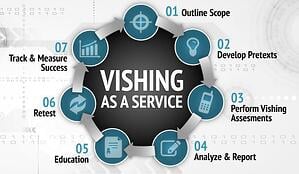
Phone Scam and Vishing in Florida
Hiding behind the anonymity of phone calls, scammers use tricks to collect money or sensitive information from unsuspecting victims. They impersonate law enforcement, government agencies, and businesses in Florida and call residents. Their ultimate goal is to profit off the interaction in any way: get money or sensitive information, especially bank account details.
These phone scams, known as vishing or voice phishing, use several techniques. Regardless of the technique used — shotgun mass calls or targeted calls — two things appear in all vishing cases: a human voice and a scammer preying on human emotions.
So, instead of sending texts, the scammer has an actual conversation with the victim. During this conversation, the scammer uses several tactics to incite and exploit emotions like greed and fear.
You Cannot Trust Caller IDs Because Of Spoofing
Scammers can conceal or change their caller identity by exploiting Voice Over IP — a technology that lets you make phone calls with the internet instead of phone lines. This is known as call spoofing.
Scammers who spoof calls do not always use family members’ names — people have different formats for saving family contacts on their phones. What’s more, it’s easy to recognize a loved one’s voice on the phone.
Instead, the scammers go for law enforcement, government agencies, and businesses. After all, calls from these entities appear with standard caller IDs, and there isn’t a familiar human voice for when these entities call. So, all the scammer has to do is make a good impression on their victim and trick them into revealing sensitive information on the phone.
How To Protect Yourself From Vishing In Florida
The silver bullet for vishing and call spoofing is to leave unsolicited calls unanswered, even if the call is from a government agency. There are five recommended ways to further protect yourself from these phone scams.
Leave suspicious calls unanswered
Because of the uptrend in phone scams and vishing in Florida, if you receive a phone call from an unknown caller, your best bet is to leave the call unanswered — the caller can always leave a message if the call is important.
Do a reverse phone search
If you are curious about the caller’s identity, it is now easier to identify unknown callers with reverse phone search. Like a regular web search, a reverse phone search involves entering the number on the Florida phone numbers database. The database then retrieves the name, location, and other important, publicly available information about the person. So, if it’s a scammer on the phone, you’ll spot them from a mile away.
Don’t share sensitive information over the phone
Vishers with spoofed caller ids can sound very convincing. But you don’t have to share any information regardless of threats or the implied urgency of the situation. In fact, government agencies often reiterate that a government official will never ask for money, your full social security number, passwords, or bank account details over the phone.
Find the agency’s contact on their official website yourself
If you would be uncomfortable telling a stranger your social security number, apply the same caution with faceless callers. Instead, ask for a callback number and hang up. Then, find out the agency or business contact phone number by yourself. This information is available on the “Contact Us” page of every government agency’s official website. A web search with the agency’s name + phone number can also prove handy.
Enable call blocking on your phone
When you identify a scam call, you can use your phone’s call blocking options to manually prevent future calls from the phone number. On Android, this option is available through your call log when you click on the phone number. You may also download reputable call blocking apps from your app store. Some of these apps automatically detect phone numbers that have been reported as scams and block calls from them.
Report Vishing So The Law Can Catch Up With Scammers
Government agencies rely on reports to go after scammers. Reports from several people let them form a picture of the scam, find patterns, have phone numbers to trace, and eventually catch and prosecute scammers.
If you have been called by an impostor, report the call to your Police Department or Florida Sheriffs Association. Likewise, you may notify the government agency or business directly. Then, report the scam online to the Federal Trade Commission (FTC) and the Federal Communications Commission (FCC).
You may also directly report the scam to the following agencies:
Office of the Florida Attorney General
State of Florida
PL-01 The Capitol
Tallahassee, FL 32399-1050
Telephone Numbers
| Switchboard: | 850-414-3300 |
| Citizens Services: | 850-414-3990 |
| Human Resources ADA Coordinator: | 850-414-3900 |
| Florida Relay/TDD: | 800-955-8771 |
| Florida Toll Free: | 1-866-966-7226 |
| Fax numbers: | Find the fax number of the section you are contacting |
Federal Bureau of Investigation (Miami Office)
2030 SW 145th Avenue
Miramar, FL 33027
Phone (754) 703-2000




